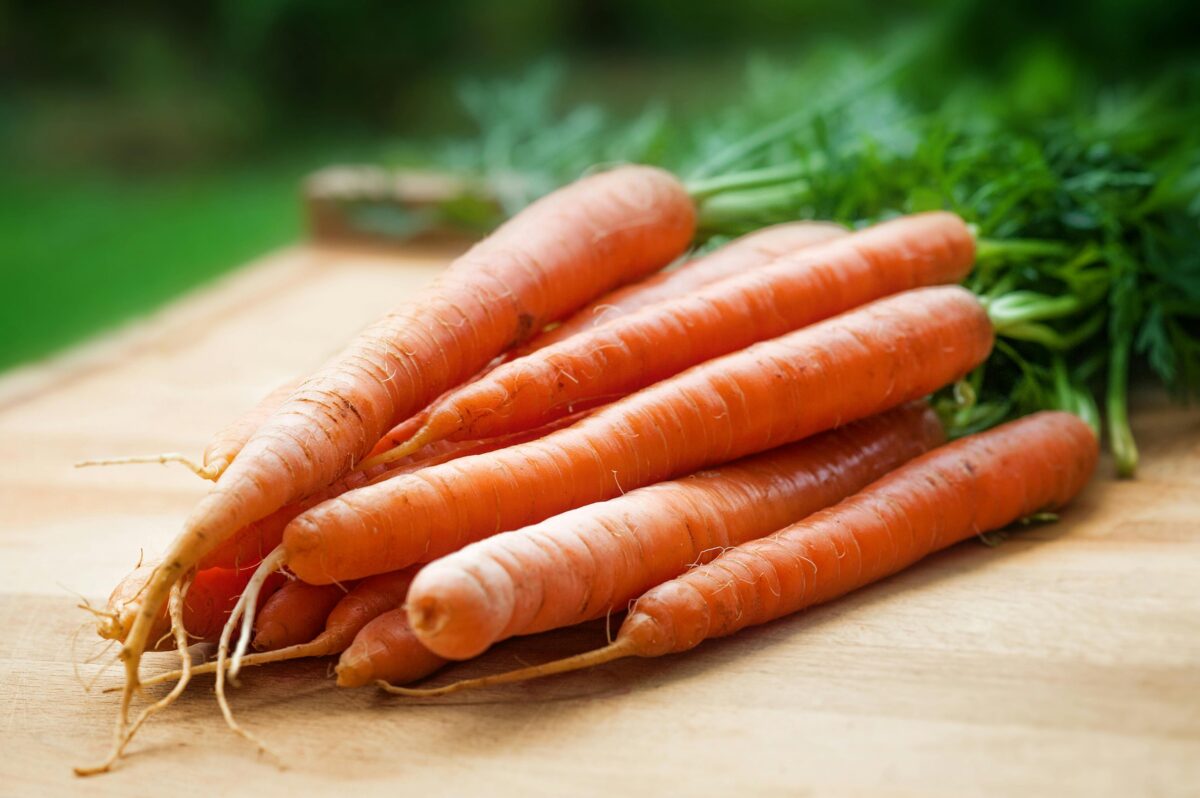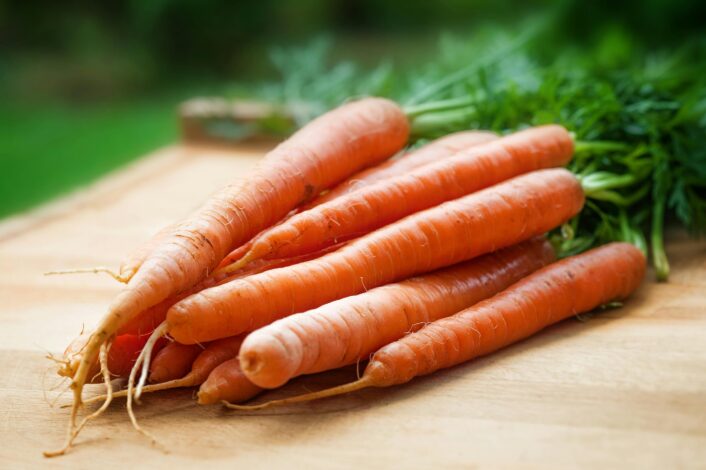The Genetics of Raw Carrots Liking
harvey
on
May 1, 2024

Latest Posts
Table of Contents
The Genetics of Raw Carrots Liking
Date of Content: April 15, 2024
Written by: Harvey Talento
Reviewed by: Maarit Tiirikainen, PhD
The humble carrot. A lunchbox staple, a bunny rabbit’s delight, and a surprising source of debate. People often find raw carrots irresistibly appealing, but what exactly makes them so likable?
There’s a certain satisfaction in biting into a crisp, cold carrot. The snap, the release of sweet, earthy flavor, the refreshing juice – it’s a sensory experience. Unlike some other vegetables, raw carrots are easy to grab and munch on, making them a convenient and healthy snack.
But why do some individuals find raw carrots more, or less, enjoyable than others?

The Nutritional Powerhouse Within
Beyond taste and texture, raw carrots offer numerous health benefits, making them a nutritional powerhouse:
- Vitamin A: Raw carrots are rich in beta-carotene, which the body converts to vitamin A. This vitamin is essential for vision, immune function, and cell growth.
- Fiber: Raw carrots provide a good amount of fiber, aiding digestion and promoting feelings of fullness, which can assist with weight management.
- Antioxidants: Carrots are packed with antioxidants, protecting cells from damage and potentially reducing the risk of chronic diseases.
- Hydration: With a high water content, raw carrots serve as a hydrating snack, ideal for hot days or post-workout replenishment.
It’s worth noting that while some nutrients, like vitamin A, are readily absorbed from raw carrots, others, such as lycopene, become more bioavailable when carrots are cooked with a bit of fat.
Raw vs. Cooked Carrots
Unable to decide between raw or cooked carrots? The good news is, you don’t have to choose! Both preparations offer distinct advantages:
- Raw: It retains the most vitamin C and is a great source of fiber, perfect for on-the-go snacking.
- Cooked: Enhances sweetness and unlocks certain antioxidants like lycopene. Roasting, in particular, brings out a delicious caramelized flavor.
Ultimately, the best way to enjoy carrots is whichever way suits your preferences. Experiment with different cuts and dips to find your perfect carrot combination.
How Genetics May Influence Raw Carrots Liking
In 2022, a large-scale GWAS study of food liking identified 1,401 significant food-liking associations which showed substantial agreement in the direction of effects with 11 independent cohorts.
The study used genetic correlations combined with genomic structural equation modeling to create a multi-level map of the relationships between different food preferences, highlighting three main domains that they define as “Highly palatable”; including desserts, meat, and savory foods, “Low caloric”; including vegetables, fruit, and whole grains, and “Acquired” foods including unsweetened coffee, alcohol, cheese, and strong-tasting vegetables.
LifeDNA references this study to analyze specific genes in order to provide personalized insights into raw carrots liking. Genes with genetic variants (SNPs) associated with raw carrots liking include FTO (rs9972563), SEMA6D (rs11070592), and MSRA (rs2952186).
Genetic factors have been identified as associated with different facets of food preferences, potentially influencing our fondness for food through diverse channels linked to brain development, energy use, and our perception of rewards. Investigating the influence of genetic diversity on food preferences could offer insights into the genetic and neurological underpinnings of our culinary inclinations and choices, which are crucial for devising improved dietary strategies and crafting more enticing food selections.
Non-Genetic Factors Influencing Raw Carrots Liking
When considering the enjoyment of raw carrots, numerous factors beyond genetics contribute to shaping individual preferences and experiences:
- Taste Sensitivity: Variations in taste bud sensitivity, particularly towards bitterness, can significantly impact one’s liking for raw carrots. Individuals with a heightened perception of the bitter compounds in carrots may find them less palatable, thus affecting their overall enjoyment.
- Learned Preferences: Early experiences and cultural influences play a pivotal role in shaping dietary preferences. Exposure to raw carrots during formative years, coupled with positive associations, can foster a preference for this crunchy vegetable. Conversely, negative encounters or lack of exposure may lead to a dislike or indifference towards them.
- Sensory Characteristics: The sensory aspects of carrots, encompassing texture, temperature, and visual appeal, contribute substantially to their overall appeal. Younger carrots, characterized by their sweetness and crispiness, are often favored over older, woodier ones that may lack the same pleasurable qualities.
- Flavor Pairings: Pairing flavors strategically can enhance the appeal of raw carrots. Combining them with complementary companions such as hummus, ranch dressing, or cheese can transform the eating experience, making it more enjoyable and satisfying.
Suggestions on Preparing Raw Carrots
To optimize the enjoyment of raw carrots, individuals can consider the following practical tips:
- Freshness: Opting for young, firm carrots with vibrant orange hues ensures optimal flavor and texture. Freshness enhances taste and contributes to a crispier texture, elevating the overall eating experience.
- Cutting Style: Experimenting with different cutting styles, from sticks to ribbons or baby carrots, can introduce variety in texture and presentation. Varying the texture adds an element of surprise and interest to each bite.
- Dipping Sauces: Offering an array of dipping sauces such as hummus, guacamole, or yogurt-based dips can enhance the flavor profile of raw carrots, making them more enticing and enjoyable.
- Pairing with Other Vegetables: Pairing raw carrots with an assortment of colorful vegetables such as celery, bell peppers, or cucumbers not only adds visual appeal but also introduces a variety of textures and flavors, enriching the overall snack experience.
Eating Too Many Carrots
The notion that eating l carrots can result in an orange hue to the skin is a common misconception. While carrots are indeed rich in beta-carotene, the pigment responsible for their characteristic orange color, it’s highly unlikely that moderate carrot consumption will lead to such an effect.
Carotenemia, the condition in question, arises from an excessive intake of beta-carotene, which the body converts into vitamin A. However, rather than posing a significant health risk, excess beta-carotene is typically stored in fatty tissues, resulting in a subtle yellowish discoloration of the skin, particularly noticeable on the palms and soles. Fortunately, this condition is reversible and does not typically cause harm.
Note: Individuals with specific medical conditions, such as hypothyroidism or liver disorders, may need to exercise caution regarding their beta-carotene intake. Consulting a healthcare professional is advisable if there are concerns about dietary choices and their potential effects.
About the LifeDNA Nutrition Report
Discover a more vibrant you with the LifeDNA Nutrition Report, a personalized analysis of your DNA that offers tailored advice on nutrition based on your unique genetic makeup.
By understanding how your body reacts to and processes food, you can make smarter choices to reach your wellness goals and avoid potential health risks.
With practical recommendations and comprehensive insights into wellness beyond just food, the LifeDNA Nutrition report empowers you to take control of your well-being simply and effectively. Order your report today and take the first step towards a better you!
Summary
- Raw carrots offer a wealth of wellness benefits, boasting essential nutrients like vitamin A, fiber, and antioxidants. These nutritional powerhouses support vision, digestion, and overall well-being. Whether snacking on them raw or cooked, carrots contribute to a balanced diet and promote good health.
- The debate between raw and cooked carrots is resolved by recognizing the benefits of both preparations. While raw carrots retain maximum vitamin C and offer convenient snacking, cooked carrots develop enhanced sweetness and unlock different antioxidants like lycopene. Whether enjoying them crisp or caramelized, carrots in any form provide a tasty and nutritious addition to meals.
- Genetic factors play a significant role in shaping individuals’ preferences for raw carrots and other foods. Through studies like the GWAS analysis, specific genes such as FTO, SEMA6D, and MSRA have been linked to varying degrees of liking for raw carrots. Understanding genetic influences on food preferences offers insights into personalized dietary choices and the biological mechanisms behind taste preferences.
- Beyond genetics, several non-genetic factors influence one’s liking for raw carrots. These include taste sensitivity, learned preferences, sensory characteristics, and flavor pairings. Factors like early experiences, cultural influences, and texture preferences all contribute to individuals’ enjoyment of raw carrots and can guide strategies for enhancing their appeal.
- Maximizing the enjoyment of raw carrots involves thoughtful preparation techniques. Choosing fresh, vibrant carrots, experimenting with cutting styles, offering flavorful dipping sauces, and pairing with complementary vegetables all enhance the sensory experience and increase the likelihood of enjoyment. By tailoring preparation methods to personal preferences, raw carrots can become a delicious and satisfying snack or side dish.
- Moderate carrot consumption is unlikely to cause carotenemia. While carrots are rich in beta-carotene, excess intake typically results in harmless skin discoloration rather than any serious health concerns.
References
- https://health.clevelandclinic.org/reasons-why-carrots-of-all-colors-are-healthy-for-you
- https://fdc.nal.usda.gov/fdc-app.html#/food-details/170393/nutrients
- https://www.nature.com/articles/s41467-022-30187-w
- https://www.researchgate.net/publication/311248573_My_idol_eats_carrots_so_do_I_The_delayed_effect_of_a_classroom-based_intervention_on_4-6-year-old_children%27s_intake_of_a_familiar_vegetable
- https://www.ncbi.nlm.nih.gov/books/NBK534878/
- https://health.clevelandclinic.org/can-eating-too-many-carrots-turn-your-skin-orange
Customer Reviews




*Understanding your genetics can offer valuable insights into your well-being, but it is not deterministic. Your traits can be influenced by the complex interplay involving nature, lifestyle, family history, and others.
Our reports have not been evaluated by the Food and Drug Administration. The contents on our website and our reports are for informational purposes only, and are not intended to diagnose any medical condition, replace the advice of a healthcare professional, or provide any medical advice, diagnosis, or treatment. Consult with a healthcare professional before making any major lifestyle changes or if you have any other concerns about your results. The testimonials featured may have used more than one LifeDNA or LifeDNA vendors’ product or reports.
- Category: Nutrition



